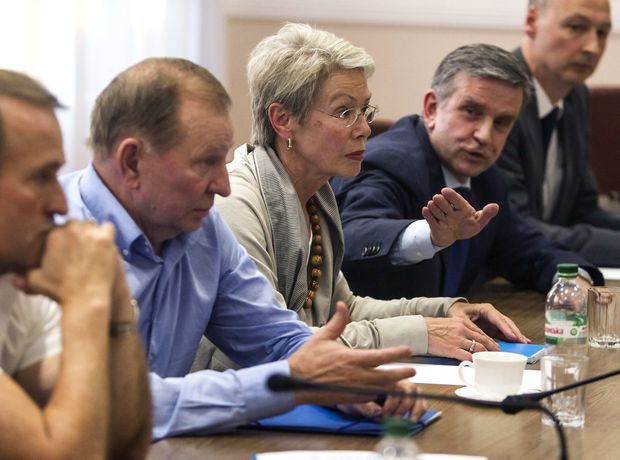
Working Groups on Ukraine: Tentacles of the Minsk Process
Publication: Eurasia Daily Monitor Volume: 12 Issue: 92
By:

A new format of negotiations between the Ukrainian government and the Moscow-controlled “people’s republics” began operating on May 14 in Minsk (Osce.org, Interfax, Ukrinform, May 14). Four specialized Working Groups have now been launched, with a view to implementing the military, political, economic, and humanitarian clauses of the February 12 Minsk armistice agreement (Minsk Two).
This format’s launching marks a further step toward equalizing the Donetsk and Luhansk “people’s republics” (“DPR,” “LPR”) as parties to negotiations with Kyiv, de facto contributing to their legitimization. The Working Groups are to operate within the Contact Group—Ukraine, Russia, DPR, LPR and the Organization for Security and Cooperation in Europe (OSCE)—and their composition is the same. They award the Russian side multiple seats at the table, isolate Ukraine, and obscure Russia’s responsibility as an initiating party to this state-on-state conflict.
The armistice imposed on Ukraine on February 12 had envisaged the creation of such Working Subgroups. The Ukrainian government attempted to negotiate the Working Groups’ agendas and composition, hoping to reduce the harm to Ukraine’s interests, to wit: status elevation of the “DPR-LPR,” holding of internationally-accepted elections there, and Ukrainian contributions to financing the “people’s republics’ ” social budget. For its part, Russia accused Ukraine of stalling and disregarding armistice “obligations.”
Ultimately, Moscow used the “Normandy Quartet” (Ukraine, Russia, Germany and France) again as a multiplier of pressures on Kyiv. On April 30, Russian President Vladimir Putin, German Chancellor Angela Merkel, and French President Francois Hollande held a planned telephone conference with Ukrainian President Petro Poroshenko, concluding with a decision to convene the Contact Group within one week in Minsk and inaugurate the Working Groups there (Kremlin.ru, Bundeskanzlerin.de, April 30).
That done (Osce.org, May 6), the Normandy Quartet leaders shall meet to assess the process within three months. The DPR and LPR negotiators welcomed the new “breakthrough” in Minsk (Donetskoye Agentstvo Novostei [DAN], May 6). Russia’s Ministry of Foreign Affairs similarly welcomed this new mechanism of “direct dialogue” between Kyiv and Donetsk-Luhansk, casting Russia as a facilitator, and with the OSCE chairing the process.
The Working Groups are to meet on a weekly basis, at locations alternating between Minsk and one or the other of “the sides” [Kyiv and Donetsk-Luhansk], by mutual agreement. The Contact Group (being the working groups’ umbrella) retains the competency to make decisions.
Given the working groups’ lopsided composition and the Normandy oversight, Ukraine can anticipate that its interests will be short-changed in these four specialized groups.
The working group on military and security issues is supposed to handle the monitoring of the ceasefire and verification of the pullback of heavy weaponry. Russia, however, has vetoed the technical and human resources that the OSCE’s mission needs for those tasks; while Russia’s proxy forces are often denying the necessary access. The combined Russian and secessionist forces continue low-level hostilities and threaten with another offensive to extort political concessions from Ukraine.
The group on political affairs is expected to advance the holding of OSCE-blessed local elections in the “DPR and LPR.” This would then supposedly qualify the two “people’s republics” to negotiate a “special status,” further intensifying pressures on Kyiv to concede. Ukraine, however, insists that any valid elections in those territories can only be held under Ukrainian legislation, with free campaigning by Ukrainian political parties, free media access, and without interference by the “DPR-LPR” military and police.
The working group on economic and social affairs looks set to discuss how the Ukrainian government should pay into the “people’s republics” social budgets. With security nonexistent locally in any legitimate sense and the banking transfer system blocked, Russia and its Normandy partners want Kyiv to restore banking transfers. Participants in this group’s May 14 meeting presented Ukraine with this demand (Interfax, May 14). For their part, the Donetsk and Luhansk authorities continue blocking the access of Ukrainian aid cargos (whether governmental or private); while Russia sends aid convoys with uncertain (often suspect) content, refusing OSCE or Red Cross inspection.
The group on humanitarian affairs is expected to focus on reciprocal exchanges of captives of various categories (combatants from both sides, illegally detained civilians on the Donetsk-Luhansk side). Ukraine proposes all-for-all exchanges without any delays. Donetsk and Luhansk, however, withhold full information about their captives, and prevaricate to extort concessions from Kyiv on unrelated matters.
The OSCE’s troika of Serbia, Switzerland and Germany (respectively the incumbent chair, immediate past chair, and upcoming chair of the OSCE), together with the OSCE’s Secretary General Lamberto Zannier (Italian diplomat), have selected the working groups’ coordinators: Ertugrul Apakan (Turkish diplomat, chief monitor of the OSCE’s special monitoring mission to Ukraine) for the group on military and security issues; Pierre Morel (French diplomat, former European Union Special Representative for the crisis in Georgia, 2008–2011, and earlier for the Karabakh conflict) to coordinate the working group on political issues in this “conflict in Ukraine”; Thomas Mirow (German Social-Democrat politician, former EBRD president) to coordinate the working group on economic affairs; and Heidi Tagliavini (Swiss diplomat, former Deputy Head of the United Nations Observer Mission in Georgia (Abkhazia), former EU rapporteur on the origins of the 2008 Russia-Georgia war, currently the overall chair of the Contact Group in Ukraine) doubling as interim coordinator of the working group on humanitarian affairs.
In this constellation of diplomats Zannier, Morel, and Tagliavini are veterans of multiple negotiations and missions to handle Russia-initiated conflicts against neighboring countries. That diplomatic record could be described as one of unrelieved failure, unless those efforts really sought to conserve (“freeze”) those conflicts on terms imposed by Russia, which turned out to be the case to date. By most indications, the Normandy and Minsk processes are heading in a similar direction in Ukraine’s east.




